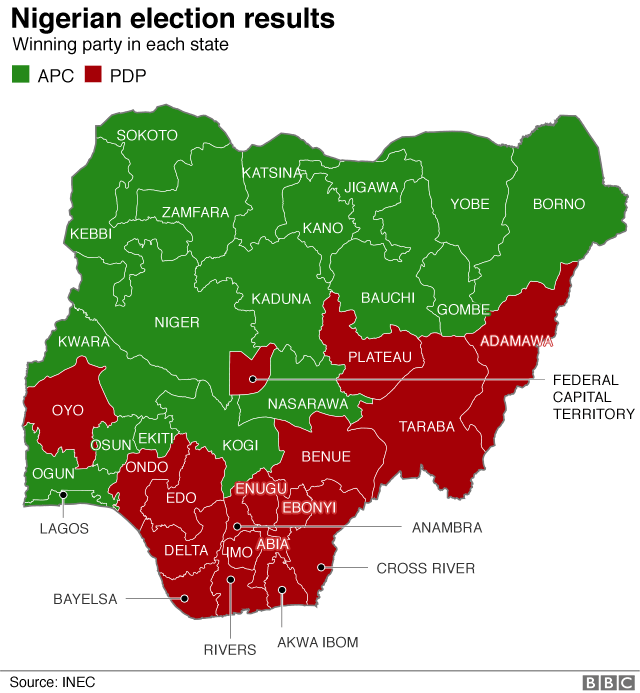Votes are being counted in 29 of Nigeria’s 36 states, after polls to elect state and local representatives.
The state elections, which took place on Saturday, came two weeks after the presidential election.
In oil-rich Nigeria, some state governors control budgets larger than those of neighbouring countries – so these seats are often keenly contested.
President Muhammadu Buhari beat his main rival Atiku Abubakar on 23 February, securing a second term.
Seven states – Kogi, Bayelsa, Ekiti, Osun, Ondo, Edo and Anambra – did not hold elections because their governors have not finished their four-year terms.
What happened in the presidential elections?
In last month’s poll, Mr Buhari’s All Progressives Congress (APC) got 15.2 million votes across the country, while Mr Abubakar’s People’s Democratic Party (PDP) received 11.3 million. There are 73 million registered voters.
The APC won 19 states, while the PDP secured 16, plus the capital, Abuja.

Mr Abubakar said the election was a “sham” and was not free and fair. He has since filed a petition challenging President Buhari’s win.
Although turnout for the presidential election was low across the country, it was higher in the northern states – one factor behind Mr Buhari’s victory.
Reports of violence
Fears of possible election-related violence led to a massive deployment of security personnel across the country, and on Friday the army said it would ensure that people could vote in a non-violent environment.
However, police told Agence France-Presse that a local election observer was killed in the southeastern state of Enugu on Saturday, after being “hit by a stray bullet fired by a policeman to disperse a group of protesters”.
Analysis: Governors impact lives directly
By Aliyu Tanko, BBC Africa, Abuja
Most Nigerians take state elections seriously because their lives are directly impacted by the governor and representatives in the state legislature.
For instance, in 2000, Governor Ahmed Sani Yerima introduced sharia law in Zamfara state and some other state governors in the north followed suit, even though the federal government wasn’t fully in support.
The governors also enjoy political influence and control huge budgets.
Lagos has an estimated population of 17.5 million people – this is more than the combined population of Gabon, The Gambia, Liberia, Cape Verde and Sierra Leone.
The state’s GDP is more than that of Kenya. In fact, Lagos would be the fifth largest economy in Africa if it were a country. Other key battlegrounds are Kaduna, Akwa Ibom, Imo, Kano and Kwara.